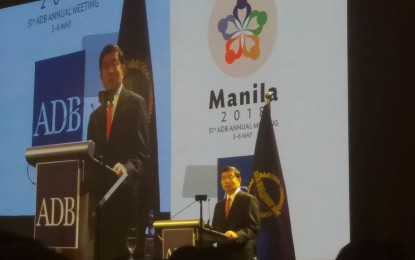
Asian Development Bank President Takehiko Nakao
MANILA -- The Asian Development Bank (ADB) will work with Asia-Pacific countries, including the Philippines, to build more quality infrastructure and other development projects in partnership with the private sector.
This is to support inclusive and sustainable growth momentum, the regional development bank said.
ADB President Takehiko Nakao highlighted on Saturday the 10 priorities in the ADB's so-called "Strategy 2030", a new long-term strategy to respond to the rapid changes in the region.
“We will mobilize private sector resources to meet the region’s huge development financing needs. Our private sector operations help fill market gaps and promote private sector participation in infrastructure and other development finance,” he said at the opening session of the Board of Governors at the 51st ADB annual meeting held in Manila.
Nakao said the ADB would further scale up private sector operations, widen their geographic coverage, including new and frontier markets, and expand operations in social sectors, such as health and education.
“We will also continue to promote the effective use of public-private partnerships. We will enhance resource mobilization through credit enhancement operations and co-financing with bilateral and multilateral partners,” he said.
To strengthen governance, Nakao said the ADB would support public sector management reforms through policy-based lending and dialogue.
“ADB will help governments enhance their capacity to prepare, implement, and operate high-quality projects, and we will help raise standards globally for environmental and social safeguards, sound financial management, and anti-corruption,” he added.
In the Philippines, the ADB chief said it was financing urban mass transport in Manila and Davao, the railway connecting Malolos and Clark, roads and bridges in Mindanao, and clean water and sanitation projects in local communities.
Nakao also took note of the Duterte administration’s implementation of an ambitious “Build, Build, Build” infrastructure plan, and a comprehensive 10-point socioeconomic reform agenda, which includes investing in people and promoting rural development.
He added the bank would prioritize tackling the remaining poverty and increasing inequalities in Asia and the Pacific.
“We will help create quality jobs, promote secondary and tertiary education, expand universal health care, and strengthen social protection programs. We will focus on lagging areas and pockets of poverty even in middle-income countries,” he noted.
Nakao said the ADB was supporting school-to-work programs, financial inclusion and capital market reform, and conditional cash transfers to poor families in the Philippines.
The ADB chief further cited other priorities in the Strategy 2030. These include accelerating progress in gender equality, scaling up support to combat climate change by building climate and disaster resilience and enhancing environmental sustainability, and building livable cities that are competitive, green, resilient, and inclusive.
Strategy 2030 also aims to promote rural development and food security, foster regional cooperation and integration, further strengthen ADB's role as a provider and facilitator of knowledge.
“We will continue to use our financial resources efficiently and creatively,” said Nakao. “We will expand our presence on the ground. We will dramatically modernize business processes to speed up our services to clients.”
Meanwhile, as it continues to respond to the growing needs of the region, ADB’s total commitments last year reached USD32 billion, a 26-percent increase from 2016. (PNA)
